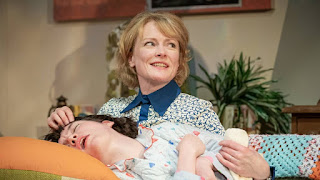Terry Johnson has established himself as an excellent writer and director and having seen his wonderful play about theatre director Ken Campbell at the Bunker, I was excited to see the new tour of Prism his play about the extraordinary Cinematographer Jack Cardiff. Cardiff was the cinematographer on Black Narcissus (1947), The Red Shoes (1948) and African Queen (1951) and we are reminded before the play starts of these three films in neat fore stage screens with black and white stills and clips from these films. He also worked with Laurence Olivier and Marilyn Munroe on The Prince and the Showgirl (1957). Johnson uses these memories to explore the later life of Jack Cardiff when he was suffering from dementia and cleverly both educates us on his achievements and explores the impact of dementia on his close family in a dramatic and poignant play.
The play is set in the garage of his home which his son has furnished to help stir memories to assist in writing his biography and the opening sequence brilliantly explains the evolution of the aspect ratios of films by using the electric garage door to show the shape while off stage he comments on the developments . The paintings on the wall and black and white images of the female film stars not only set the scene but also are used to explain the art of lighting and highlight his marital infidelity. Tim Shortfall the designer and Ian Galloway the video designer has created an extremely interesting and effective setting for the show and the shifts from reality to imagined scenes are cleverly executed.
The transformation from the garage into the film set of the African Queen is very clever and atmospheric.
At the centre of the play is Robert Lindsay as Jack who brilliantly brings to life the man and his struggle with memory loss, confusion and failing sight while making us aware of how clever he was on film sets in capturing and creating the Producers and Director vision on film. As Jack says, "Life is temporary, film is for ever". His struggle with the biography is summed up when he says, " reliving my life is doing my head in " and defends his past behaviour by "my job was to flatter women ". It is a phenomenal performance of great variation and touching moments that make us laugh and cry.
Tara Fitzgerald plays his wife Nicola, twenty years his junior, who in his confusion he mistakes for Katherine Hepburn and who says he "slept with film stars as a hobby". She is very convincing when she appears as Hepburn in his recollection of that African set with her clipped American drawl but regrets that "when I am not her, I am faceless". Her reaction towards the end of the play when she realises, he is losing his sight is extraordinary and heartfelt.
Oliver Hembrough plays his son Mason anxiously trying to coax memories from his father to create the biography and desperately seeking recognition from his father and to emulate his father's success. He too doubles up effectively as Humphrey Bogart and Arthur Miller in the recollections.
He hires Lucy, played by Victoria Blunt as a carer to keep Jack company and to type up his memoirs who Jack describes as the " mistress of understatement". She is desperate to keep her job being nine months sober and trying to regain custody of her daughter. She loves the job as she " never knows who I am going to be " as Jack sees her as his past film stars.
The prism of the title is the devise used to split the colours in the early Technicolor cameras but also a clear metaphor for the distortion of memories by time and illness and when Jack holds it in his hand we can feel both his joy of the technology and his loss of faculties .
Director Terry Johnson brings all these elements together to present his play on stage in a compelling and moving two hours that deserves wider exposure and larger audiences to appreciate and Robert Lindsay once again compellingly demonstrates his skill as a stage performer.
There are still six venues in this tour until 30 November to catch this play. Don't miss it.
Nick Wayne
⭐⭐⭐⭐⭐️





